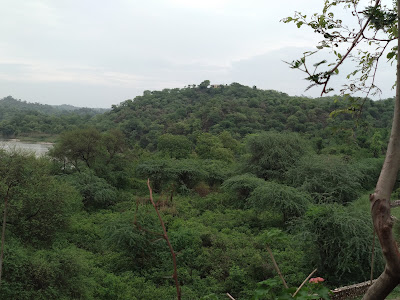Muslim Invader Sikandar Butshikan (The Idol-breaker):
Decimator of Kashmir's Rich Ancient Cultural Heritage
The Sanskrit word for Kashmir is kasmira. The Nilamata Purana describes the origin of valley from the waters - a lake called Satisaras. The local etymology of Kashmira is that it is land desiccated from water.
Another etymology gets the name from the name of sage Kashyap who is believed to have settled people in this region. Accordingly Kashmir would have been derived from Kashyap -mir (Kashyap's lake ) or Kashyap - meru (Kashyap's mountain).
During ancient period Kashmir has not only been an important centre for the development of Hindu-Buddhist syncretism but also epicentre of awesome art and architecture.The Mauryan Emperor Ashoka is credited with having founded the old capital of Kashmir Shrinagari - now in ruins on the outskirts of Srinagar.
Karkota empire, a powerful Hindu empire originated in the region of Kashmir. The dynasty marked the rise of Kashmir in South Asia. Lalitaditya Muktapida the Great, was the most powerful ruler of Karkota dynasty. He commissioned a number of shrines in Kashmir including the now-in -ruins famous Martand Sun Temple. He also established several towns including a new capital at Parihaspura now-in - ruins.
Queen Kota Rani was Hindu ruler of Kashmir until 1339. Shams-ud-Din Shah Mir was the first Muslim ruler of Kashmir, founder of Shah Mir dynasty. Shah Mir is believed to have come from Swat , and his ancestors were Kshatriya who converted to Islam.
Sikandar Shah Miri , better known as Sikandar Butshikan , was the sixth sultan of Shah Miri dynasty of Kashmir. Sikandar was a Muslim who ruled over a kingdom where the vast majority of people were Hindu or Buddhist.
Sikandar "The Iconoclast" was an extremely bigoted, dogmatic ruler who perpetrated untold tyranny and cruelty on hapless & helpless non-muslim subjects with the ulterior motive of converting them to Islam. It was under the influence of Sufi saint, Mir Mohammad Hamadani, that he committed immense atrocities against non-muslims in his lands. Large numbers of Hindus converted, fled or were killed for refusal to convert.
Sikandar got the sobriquet of but-shikan or idol-breaker. He desecrated and destroyed numerous temples, chaityas, viharas, shrines, hermitages, and other holy places of the Hindus and Buddhists. He banned dance , drama , music and other such aesthetic religious and cultural activities of the Hindus and Buddhists. He forbade the Hindus to apply Tilak Mark on their foreheads. He did not allow them to worship or pray , blow a conch shell or even to toll a bell. He went on burning temples and stopped Hindus and Buddhists from cremating their dead and compelled them to bury the bodies practicing Muslim rituals. He imposed Jizya, a poll-tax to be paid by non-Muslims. Hindus were forcibly converted to Islam and were massacred in case they refused to be converted. "Sikandarpora" was founded on the debris of the destroyed temples of the Hindus. Sikandar destroyed the temples of Maha-Shri built by Praversena, and material from these was used for constructing a 'Jami' mosque in the middle of the city. There was no town, no city, no village, no wood where the temples of gods were not broken.
" Sikandar equaled the most blood-thirsty and iconoclastic Muslim conquerors anywhere in his zeal to obliterate all traces of the Hindu religion and convert its followers to Islam on pain of death." Ajit Bhattacharya
"Many of the Brahmins rather than abandon their religion or their country poisoned themselves, some emigrated from their homes while a few escaped the evil of banishment by becoming Mohamadans." Firishta.
Sikandar got the sobriquet of but-shikan or idol-breaker. He desecrated and destroyed numerous temples, chaityas, viharas, shrines, hermitages, and other holy places of the Hindus and Buddhists. He banned dance , drama , music and other such aesthetic religious and cultural activities of the Hindus and Buddhists. He forbade the Hindus to apply Tilak Mark on their foreheads. He did not allow them to worship or pray , blow a conch shell or even to toll a bell. He went on burning temples and stopped Hindus and Buddhists from cremating their dead and compelled them to bury the bodies practicing Muslim rituals. He imposed Jizya, a poll-tax to be paid by non-Muslims. Hindus were forcibly converted to Islam and were massacred in case they refused to be converted. "Sikandarpora" was founded on the debris of the destroyed temples of the Hindus. Sikandar destroyed the temples of Maha-Shri built by Praversena, and material from these was used for constructing a 'Jami' mosque in the middle of the city. There was no town, no city, no village, no wood where the temples of gods were not broken.
| Famous ' Martand Sun Temple' Destroyed by Sikandar Butshikan Image (C) Dr Ajay Kumar Ojha |
| Ruins of Grand Martand Sun Temple Image (C) Dr Ajay Kumar Ojha |
| Ruins of Parihaspora founded by "Lalitaditya the Great" Image (C) Dr Ajay Kumar Ojha |
| Ruins of "Naranag Temple Complex" Image (C) Dr Ajay Kumar Ojha |
" Sikandar equaled the most blood-thirsty and iconoclastic Muslim conquerors anywhere in his zeal to obliterate all traces of the Hindu religion and convert its followers to Islam on pain of death." Ajit Bhattacharya
"Many of the Brahmins rather than abandon their religion or their country poisoned themselves, some emigrated from their homes while a few escaped the evil of banishment by becoming Mohamadans." Firishta.











































